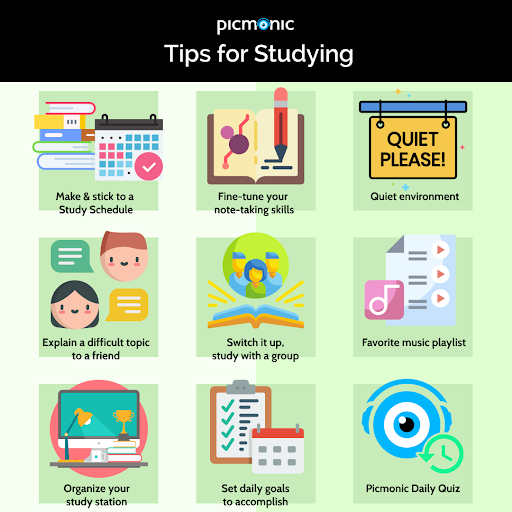Rise by Six: Your Daily Dose of Inspiration
Explore insights and stories that elevate your day.
Cramming is Out: Study Like a Pro Without Losing Your Mind
Transform your study habits! Discover pro tips to ace exams stress-free and leave cramming behind for good. Ready to level up?
Mastering Time Management: Strategies for Effective Studying
Time management is a crucial skill that can make or break your study sessions. To master time management, it's essential to implement effective strategies that align with your personal learning style. One effective method is the Pomodoro Technique, which involves studying for 25 minutes followed by a 5-minute break. This approach helps maintain focus and reduces burnout. Additionally, creating a study schedule that incorporates all subjects can assist in balancing your workload and ensuring that no topic is neglected.
Another key strategy in effective studying is prioritization. Start by listing tasks in order of importance and deadlines. This can be implemented through an organized to-do list or a digital planner. Remember to set specific, achievable goals for each study session, allowing for periodic assessments of your understanding. By mastering these time management techniques, you’ll not only enhance your learning experience but also reduce stress and improve overall academic performance.

The Science of Memory: Techniques to Retain Information Better
Memory is a complex cognitive process that involves encoding, storing, and retrieving information. Understanding the science of memory can help us develop more effective techniques to retain information. One effective method is the use of mnemonics, which involves associating new information with familiar concepts. For instance, creating acronyms or visual images can act as mental shortcuts, making it easier to recall specific facts when needed. Additionally, engaging multiple senses during learning, such as reading aloud or using flashcards, significantly enhances memory retention.
Another powerful technique is the spacing effect, which emphasizes the importance of spreading out study sessions over time. Instead of cramming all at once, learners can improve retention by reviewing material periodically. This method leverages the brain's natural ability to reinforce memory pathways through repetition. Furthermore, implementing active learning strategies, such as teaching the material to someone else or discussing it in a group, can further solidify what you've learned. By understanding and applying these scientifically-backed techniques, anyone can improve their memory and retain information more effectively.
Are Study Breaks the Key to Academic Success?
In the quest for academic success, students often find themselves buried under piles of assignments, exams, and deadlines. However, recent research suggests that study breaks may play a crucial role in enhancing overall performance. Rather than viewing breaks as a distraction, it is essential to recognize them as an opportunity for the brain to recharge and consolidate information. By stepping away from study materials for a brief period, students can improve their focus, retention, and creativity, ultimately leading to a more productive study session.
Implementing effective study breaks can take various forms, such as a quick walk, meditation, or a caffeine boost. The key is in maintaining a balanced approach, where short breaks can increase productivity by allowing for mental rest and rejuvenation. According to techniques like the Pomodoro Technique, which recommends intensive study periods followed by regular breaks, students can structure their study time more effectively. By prioritizing these essential pauses, learners may unlock a new level of academic achievement, proving that sometimes less is indeed more.